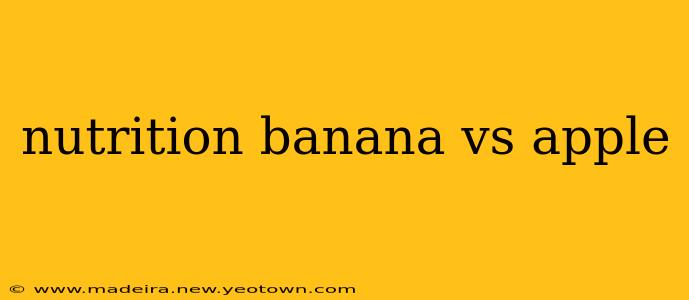Choosing between a banana and an apple often comes down to personal preference – the sweet, creamy texture of a banana versus the crisp, tart bite of an apple. But beyond taste, these fruits pack a surprising nutritional punch, each boasting a unique profile of vitamins, minerals, and antioxidants. Let's delve into a head-to-head comparison, examining their nutritional strengths and highlighting which fruit might be best suited for your specific needs.
Nutritional Breakdown: Banana vs. Apple
Imagine this: You're at the grocery store, faced with a vibrant display of both bananas and apples. Which one should you grab? To make an informed decision, let's look at the nutritional facts. Both are excellent sources of fiber, essential for digestive health and keeping you feeling full. However, their vitamin and mineral content differs significantly.
Bananas are richer in potassium, an important electrolyte for maintaining healthy blood pressure. They also boast a higher concentration of vitamin B6, crucial for brain development and function. Apples, on the other hand, are packed with vitamin C, a powerful antioxidant that supports the immune system. They also contain more fiber than bananas, particularly if you eat the skin.
Think of it like this: bananas offer a quick energy boost thanks to their natural sugars, making them a great pre- or post-workout snack. Apples, with their higher fiber content, provide a more sustained release of energy, keeping you feeling satisfied for longer.
Which Fruit Has More Fiber?
This is a question frequently asked by health-conscious individuals. While both bananas and apples contain dietary fiber, apples generally have a higher fiber content, especially when the skin is included. The skin of an apple is a treasure trove of fiber and other beneficial nutrients. Therefore, opting for apples with the skin intact will provide a more substantial fiber boost compared to a peeled apple or a banana.
Are Bananas Better for Weight Loss?
The weight-loss benefits of both fruits are often debated. Both bananas and apples are relatively low in calories and high in fiber, which can contribute to weight management. However, neither fruit is a miracle weight-loss solution. The key to weight loss is a balanced diet and regular exercise. Both bananas and apples can be part of a healthy weight-loss plan, but portion control is crucial.
Which Fruit Is Better for Your Gut Health?
Both bananas and apples contribute to gut health in their own way. Bananas contain prebiotics, which feed the beneficial bacteria in your gut. Apples, on the other hand, are a rich source of pectin, a type of soluble fiber that acts as a prebiotic and promotes the growth of beneficial gut bacteria. The specific contribution to gut health depends on individual gut microbiome and tolerance. Both, however, play a positive role.
Are Apples or Bananas Higher in Sugar?
This is another frequent question. Both bananas and apples contain natural sugars, but bananas generally have a higher sugar content than apples. While natural sugars are not inherently bad, consuming excessive amounts can lead to blood sugar spikes. Individuals with diabetes or those watching their sugar intake might need to moderate their banana consumption compared to apples.
Conclusion: The Best Fruit Depends on Your Needs
Ultimately, there isn't a single "better" fruit between a banana and an apple. The optimal choice depends on your individual nutritional needs and preferences. Bananas offer a quick energy boost and are richer in potassium and vitamin B6. Apples, particularly those with the skin on, are higher in fiber and vitamin C. Both fruits offer significant health benefits and can be incorporated into a balanced diet. The best approach is to enjoy both as part of a diverse and nutritious eating plan!

